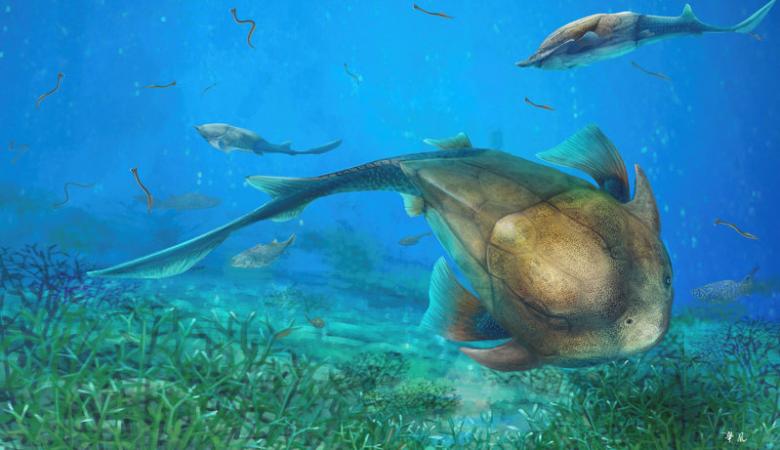A bottom-dwelling, mud-grubbing, armored fish that swam in tropical seas 423 million years ago is fundamentally changing the understanding of the evolution of an indisputably indispensable anatomical feature: the jaw.
Scientists said they unearthed in China’s Yunnan province fossils of a primordial fish called Qilinyu rostrata that was about 12 inches (30 cm) long and possessed the telltale bones present in modern vertebrate jaws including in people, according to Reuters.
Qilinyu was part of an extinct fish group called placoderms, clad in bony armor covering the head and much of the body and boasting jaws armed with bony plates that acted as teeth to slice and dice prey.
Fish were Earth’s first vertebrates when they appeared more than half a billion years ago, but they were primitive and jawless, with sucker-like mouths. Placoderms were the first vertebrates with jaws, a pivotal evolutionary advance that enabled them to grasp prey, but they had no teeth. Teeth appeared for the first time in later fish.
Qilinyu had three bones, the dentary, maxilla and premaxilla, that characterize the modern vertebrate jaw seen in bony fish, amphibians, reptiles, birds and mammals, though they are absent in the cartilaginous sharks and rays.
Scientists long viewed placoderms as a fascinating evolutionary dead-end. But the fossils of Qilinyu and another placoderm called Entelognathus that also possessed the three bones indicate that the elements of the modern jaw first appeared in placoderms.
The maxilla and premaxilla are bones of the upper jaw. The dentary is a bone of the lower jaw.
It appears they evolved from the bony plates that placoderms used to sheer flesh in lieu of teeth, said paleontologist Per Ahlberg of Sweden’s University of Uppsala, who helped lead the study published in the journal Science.
“In us, the lower jaw is made entirely from the dentary. Most of the upper jaw is composed from the maxilla, but the bit that carries the incisor teeth is the premaxilla,” Ahlberg said.
The findings contradict the long-held notion that the modern jaw architecture evolved later, in the earliest bony fish.
“Now we know that one branch of placoderms evolved into modern jawed vertebrates,” said study co-leader Zhu Min, a paleontologist at Chinese Academy of Sciences’ Institute of Vertebrate Paleontology and Paleoanthropology. “In this sense, placoderms are not extinct.”
Qilinyu had a flat underside, ate soft-bodied mud-dwelling invertebrates. It was a modest member of the placoderm group, which included Earth’s first true monster, a fish called Dunkleosteus with huge, powerful jaws that was bigger than a great white shark.
H.Z

